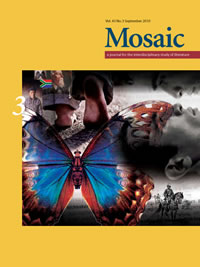Issue 43.3
Overview

General Issue
Published: September 2010
View the issue introduction or see the issue summary and contents below.
11 essays, totalling 192 pages
$19.95 CAD
Don’t miss this tightly knit, yet richly varied, issue featuring essays on space and movement in space—migrancy, walking, sound, and the synaptic—as well as essays on disciplinary power in the university, film adaptations of Emma, epideictic rhetoric, Atwood’s Oryx and Crake, The Truman Show, Browning read with Lacan, and Confucianism read with evangelical Christianity.
Discipline in DisgracePatrick Lenta In Disgrace, J.M. Coetzee provides a critique of the contemporary market-driven university and its disciplinary apparatus that is indebted to Michel Foucault’s analysis of disciplinary power. Coetzee stages the disciplining of an academic whose conduct, driven by deviant desires, runs counter to the objectives of the corporate university. | |
Film Adaptations of Emma between Agency and SubmissionKristel Thornell This essay interrogates two film adaptations of Jane Austen’s Emma, Amy Heckerling’s Clueless and Douglas McGrath’s Emma, reading the portrayals of “femininity” as complex and unstable: simultaneously conservative and progressive. | |
Sounding WaldenLaura Zebuhr “Sounding Walden” puts Thoreau’s text in conversation with Ovid’s Narcissus and Echo myth. It argues that by restaging the impossible relationship between Narcissus and his image, Walden challenges a model of relations based in identification. In its attention to Echo and sound, Walden advocates for relations that begin with the other rather than the “other self.” | |
Charm Offensive: Epideixis and a Microhistorical Reading of The IndianShelley Hulan This essay examines epideictic rhetoric in The Indian (1885&86), an Ontario newspaper edited by Dr. Peter Edmund Jones (Ojibwa). A microhistorical reading demonstrates that the paper’s epideixis aims to neutralize its Euro-settler readership’s potential hostility towards First Nations peoples by appearing to endorse vanishing race and other colonialist stereotypes of them. | |
The Mind and the Nervous System: Synaptic Space in the Poetry of William Carlos WilliamsDeric Corlew Following neuroscientific interest in the neuron and the reflex arc, Williams understood the mind as a system of anatomical objects arranged in space. This essay argues that Williams also viewed the space of the poem and the external world as “synaptic” systems in which things combine to form larger ideas. | |
Space and Place: Walking through KamloopsBruce Baugh Using philosophy and social theory, this essay examines walking as a privileged means of revealing the physical and social environment of a small city. My regular walk from downtown Kamloops, British Columbia, to Thompson Rivers University frames an exploration of the social, historical, and bodily construction of “space” and “place.” | |
Impossibilized Subjects in Maxine Hong Kingston’s China Men: Thoughts on Migrancy and the State of ExceptionJutta Gsoels-Lorensen This essay discusses Maxine Hong Kingston’s China Men as a text devoted to the meticulous representation of the migrant and immigrant subject before the law, taking seriously the idea, articulated by the narrative’s mother figure, that migrant or immigrant life in the United States involves existing in a constant “state of emergency,” and offering a closer look at border space as a realm of enforced law. | |
Character in a Post-national World: Neomedievalism in Atwood’s Oryx and CrakeMichael Spiegel This essay reads Atwood’s Oryx and Crake through the lens of the International Relations theory known as neomedievalism. This lens illuminates the more subversive elements of the text as Atwood questions the viability of a post-national world and challenges the capacity of the modern novel to represent it. | |
Televisual Realism: The Truman ShowTony E. Jackson This essay begins with a discussion of the paradoxical desire for realistic fiction, then, through an analysis of The Truman Show, suggests how that desire, which first comes into historical prominence with the emergence of the novel, always seeks out new means of satisfying itself, ultimately coming to its maximal, self-undoing satisfaction with the advent of television technology. | |
“Anamorphosizing” Male Sexual Fantasy in Browning’s MonologueTyler Efird Conventional scholarship relegates the male speakers of Robert Browning’s “Porphyria’s Lover” and “My Last Duchess” to the position of the deviant “other.” This essay, however, invokes an articulation of Lacan’s notion of the gaze to argue that Browning not only subverts these speakers’ respective autonomies in the fields of the visual and the linguistic, but also inverts categories of the normal and the pathological in his treatment of gender and desire. | |
The Preparation for Proselytizing: Matteo Ricci’s Treatise Jiao-You-Lun (On Friendship)Yu Liu Matteo Ricci’s treatise on friendship was his first and most influential work published in Chinese. By contrasting this text with his classical sources, this essay investigates the evolution of a strategy involving the use of the persona of a Western scholar friendly to Confucianism as a cover for Christian evangelism. |